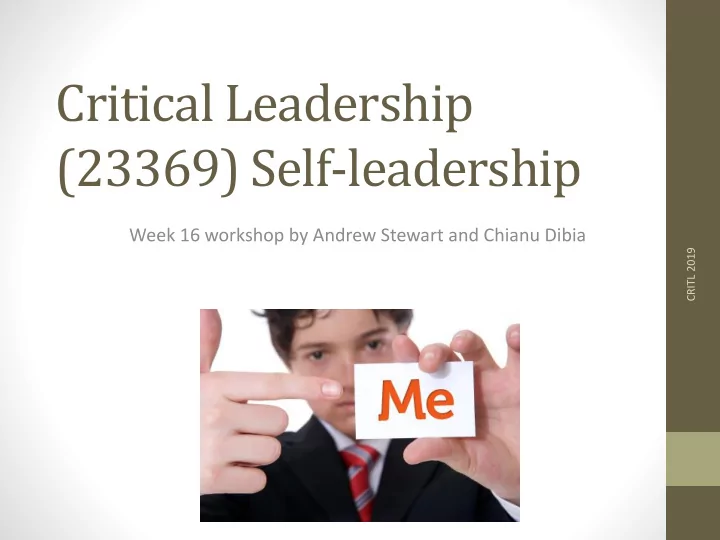

Critical Leadership (23369) Self-leadership Week 16 workshop by Andrew Stewart and Chianu Dibia CRITL 2019
Session Aims • To review self leadership as a concept • To discuss self-leadership questionnaire CRITL 2019 results • To practise reflective learning skills • Assignment 2 preparations
Activity In pairs/groups review your Self-Leadership questionnaire Which leadership theory/ies can you link this to ? CRITLE 2019 Help each other identify strengths and future development areas 15 minutes
Self-leadership questionnaire • Houghton and Neck (2002) identified 9 core areas for self leadership: • Visualizing successful performance • Self-goal setting • Self-talk • Self-reward • Evaluating beliefs and assumptions • Self-observation • Self-punishments • Self-cueing • Focus on natural rewards • These start to indicate how we can self-lead • Which are you highest or lowest on? See the paper for the full questionnaire
Activity 2: Why self-leadership is important • Review the extracts from the paper by Furtner, Baldegger & Rauthmann (2013) • Identify the key findings (7-10) • What does this tell us about the importance of self- leadership? • What relevance might this have to your development portfolio • Individual/pairs or groups • 25 minutes
Harvard Business Review • Be a better leader, have a richer life • What do you think of this article? • What are the strengths? • What are your criticisms? • What value might this idea have for you if any? • Why must you be critical of what you read?
Development portfolio • A means to monitor, build and reflect on your learning about leader selection, assessment and development • Integrates learning from your work experience, personal development and academic teaching, applying theory to practice • Contents: • Assessment of personal leader/leadership skills: • Introduction to leader/leadership assessment; Summary of self- assessment inventories; Learning from the practical leadership sessions; Other evidence sources; Summary of current strengths and development needs • Personal leader/leadership development Plan: • Introduction to leader and leadership development techniques; Summary of plans to meet identified development needs ; Rationale for development plan choices • Bibliography • Appendices • Requires reflective learning
Reflective learning A defining feature of professional practice (Schön, 1991; CIPD 2013); concept of the ‘reflective practitioner’ Reflection :- defined as stepping back to consider experience and meaning Q. How did that go? What went well? What didn’t? And why? Reflective practice:- on the job ‘in - action’ or post -event problem-solving e.g. A debrief or wash-up Q. What would I change if I did it again? Critical reflection:- Assessing the validity of personal assumptions and beliefs that encourages learning at a deeper level Q. What theory underpins this? and What are my value perspectives?
The Continuing Development Cycle. Kolb, 1974 Personal Experience Prioritise and Review experience Plan Reflection Thinking and Conclude
Experience Struggle? Fun? Experience without reflection is not learning Plan Image? Perspective Reframe Consider what helps
The Starfish Story adapted from The Star Thrower by Loren Eiseley, anthropologist (1907 – 1977) Once upon a time, there was a wise man who used to go to the ocean to do his writing. One day, as he was walking along the shore, he looked down the beach and saw a human figure moving like a dancer. He smiled to himself at the thought of someone who would dance to the day, and so, he walked faster to catch up. As he got closer, he noticed that the figure was that of a young man, and that what he was doing was not dancing at all. The young man was reaching down to the shore, picking up small objects, and throwing them into the ocean. He came closer and called: “Good morning! May I ask what it is that you are doing?” The young man paused, and replied: “ Throwing starfish into the ocean .” “Why are you throwing starfish into the ocean?” To this, the young man replied: “The sun is up and the tide is going out. If I don’t throw them back in, they’ll die.” Upon hearing this, the wise man exclaimed: “But, young man, do you not realize that there are miles and miles of beach and there are starfish all along every mile? You can’t possibly make a difference!” At this, the young man bent down, picked up another starfish, and threw it into the ocean. As it met the water, he said: “It made a difference for that one.”
Find your Inner Mandela ‘ Mandela’s goal was to change behaviour, not only laws. People raised their aspirations because Mandela encouraged them. Mandela’s legacy lies in the lessons about leadership he left for all of us. He couldn’t transform everything but he could start programs and create institutions that would shift other people’s actions to a more productive path. Find your inner Mandela. Forgive and move on.’ Follow link: http://blogs.hbr.org/2013/12/find-your-inner-mandela- a-tribute-and-a-call-to-action
Activity
Only reflect... Reflection enhances our ability to question and challenge; to surface assumptions and taken-for-granted beliefs Gray (2007) argues “reflection is an active and purposeful process of exploration and discovery, often leading to unexpected outcomes” (p512) “reflection by managers on their experience .. .can act as a source (and resource) of learning and can be enhanced by critical reflectivity” (p512) Q. What has been the impact of your work experiences on your thinking?
Post session activity • Catch up on reading coursework • Make notes in your portfolio • Continue to collate evidence of your leadership and self-leadership strengths and development needs • Summary of current strengths and development needs • Preparation for next week • Reading on leader and leadership development
Recommend
More recommend